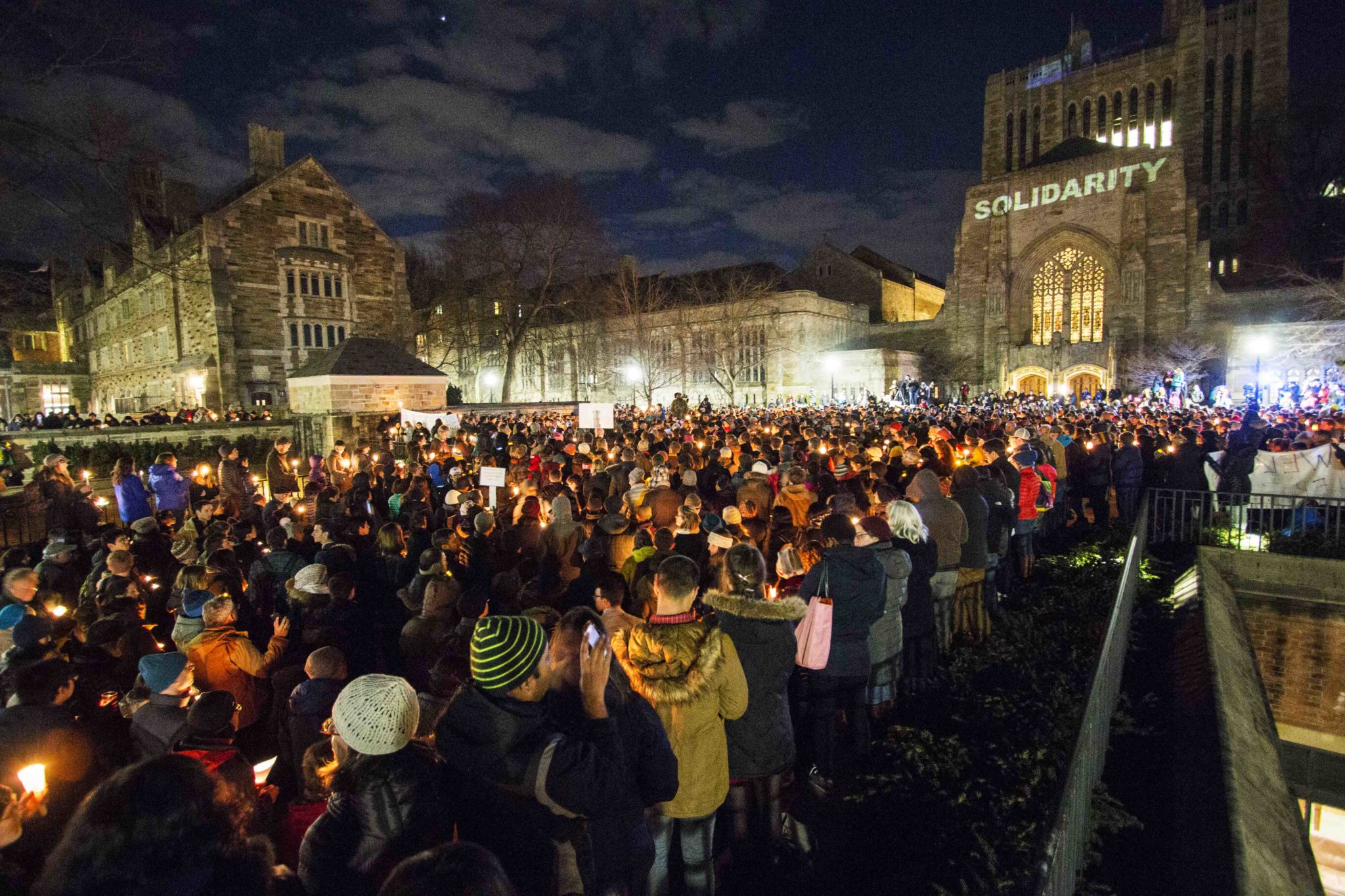
People began congregating in front of Sterling Memorial Library shortly before 6 p.m., the word “solidarity” projected onto its facade. Just 15 minutes later, the quad was filled with more than a thousand people holding candles, and the crowd and its flickering lights overflowed from Cross Campus onto Elm and Wall streets.
At a Sunday night vigil, Yale students, faculty and community members gathered to denounce President Donald Trump’s executive order on immigration, which barred citizens of seven majority-Muslim countries and refugees from entering the United States.
The vigil lasted for nearly one hour, with many in the crowd attending a benefit concert for Integrated Refugee and Immigrant Services in Battell Chapel immediately afterward.
“I hope it galvanizes the Yale community to stand up for our Muslim brothers and sisters and also all the other people who are going to feel the pain coming out of this administration,” said Gregg Gonsalves GRD ’16, an organizer of the vigil and a lecturer at Yale Law School.
The vigil was put together with less than a day’s notice by a group of community organizers who began meeting regularly after Trump’s election in November, and followed a smaller impromptu protest Saturday night and amid growing international news attention for Trump’s ban.
“It was very organic and spontaneous,” said Hope Metcalf ’96, a professor at the Human Rights clinic at Yale Law School and the executive director of the Schell Center for International Human Rights. “I personally have many students who are affected by the executive order.”
At Battell Chapel, performances from the Yale Glee Club and at least seven other groups drew a full house.
Abrar Omeish ’18, president of Yale’s Muslim Students Association, told the News that she knows of at least four Yale students who are directly affected by the order.
She also said that the Office of International Students and Scholars has contacted affected students and that the administration is “on our side.” The MSA will hold a meeting on Tuesday to start a collaboration with other organizations to brainstorm resources available to students.
Over the weekend, University President Peter Salovey sent two emails to the Yale community regarding the developing news from Washington, and residential college deans and campus leaders offered their own messages of support and reflection as well.
Salovey and other administrators attended the vigil, as did many New Haven residents.
“I’m hopeful that when people come out like this and they express points of view that are respectful, but at the same time express a different point of view, that we can move the conversation to a more responsible and productive place,” said Jim Odea, who lives in New Haven.
Ross Edwards, a professor of political science at Albertus Magnus College, said the protest was a reaction to Trump’s “amorphous” campaign promises. Trump’s policy on immigration, Edwards said, is antithetical to what a democracy represents.
“A true democracy needs to be for inclusion, and a true democracy needs to be for a humanity that understands commonality, or it’s not a democracy,” he said. “That’s a fundamental democratic tenet, and we need to stand up for that.”
The vigil followed a 100-person rally organized by Yale students on Saturday night. Spearheaded by Stephen Williams-Ortega ’20 on behalf of both the New Haven antifascist solidarity movement and the MSA, the event also aimed to show solidarity with those affected by Trump’s executive order.
At the Saturday protest, the crowd repeated messages of inclusion: “Say it loud. Say it clear. Immigrants are welcome here” and “Let them in.” As a commentary on how Trump’s executive order is in opposition to American ideals, Williams-Ortega also led the protesters in singing the national anthem.
A number of Jewish students at the protest expressed anger that Trump had signed the refugee ban on the same day as International Holocaust Remembrance Day, as well as over Trump’s failure to mention the Jews in a public memo recognizing the holiday on Friday.
“This executive order is particularly stark as a Jew,” said Avigayil Halpern ’19, the social coordinator for the Joseph Slifka Center for Jewish Life.
Several students interviewed Saturday said that Yale should play a larger role in response to the executive order. Ben Levin ’20 said he believes Yale “should be making statements right now that show that they stand with students who are against Trump’s racist policies.”
Jessica Holmes, a member of the Board of Alders for the City of New Haven, said Yale has “immense resources and power” and should use them to counter Trump’s administration.
Since Trump’s actions on Friday, New Haven Mayor Toni Harp has publicly denounced Trump’s immigration actions. Harp has been a firm advocate of New Haven’s status as a sanctuary city.
“We are standing with refugees and standing up against Trump’s unconstitutional executive order,” said Daniel Vernick ’19, a member of the Yale Refugee Project who attended the vigil. “The resistance is going to come from the grassroots and from the people rising up and standing up and standing in solidarity.”
Vernick was one of several Yale students who also attended rallies in New York City on Saturday to advocate for the release of detained immigrants from detention at John F. Kennedy International Airport.
New Haven accepted 110 Syrian refugees between January and September 2016.
Jon Greenberg, Jacob Stern and Sara Tabin contributed reporting.








